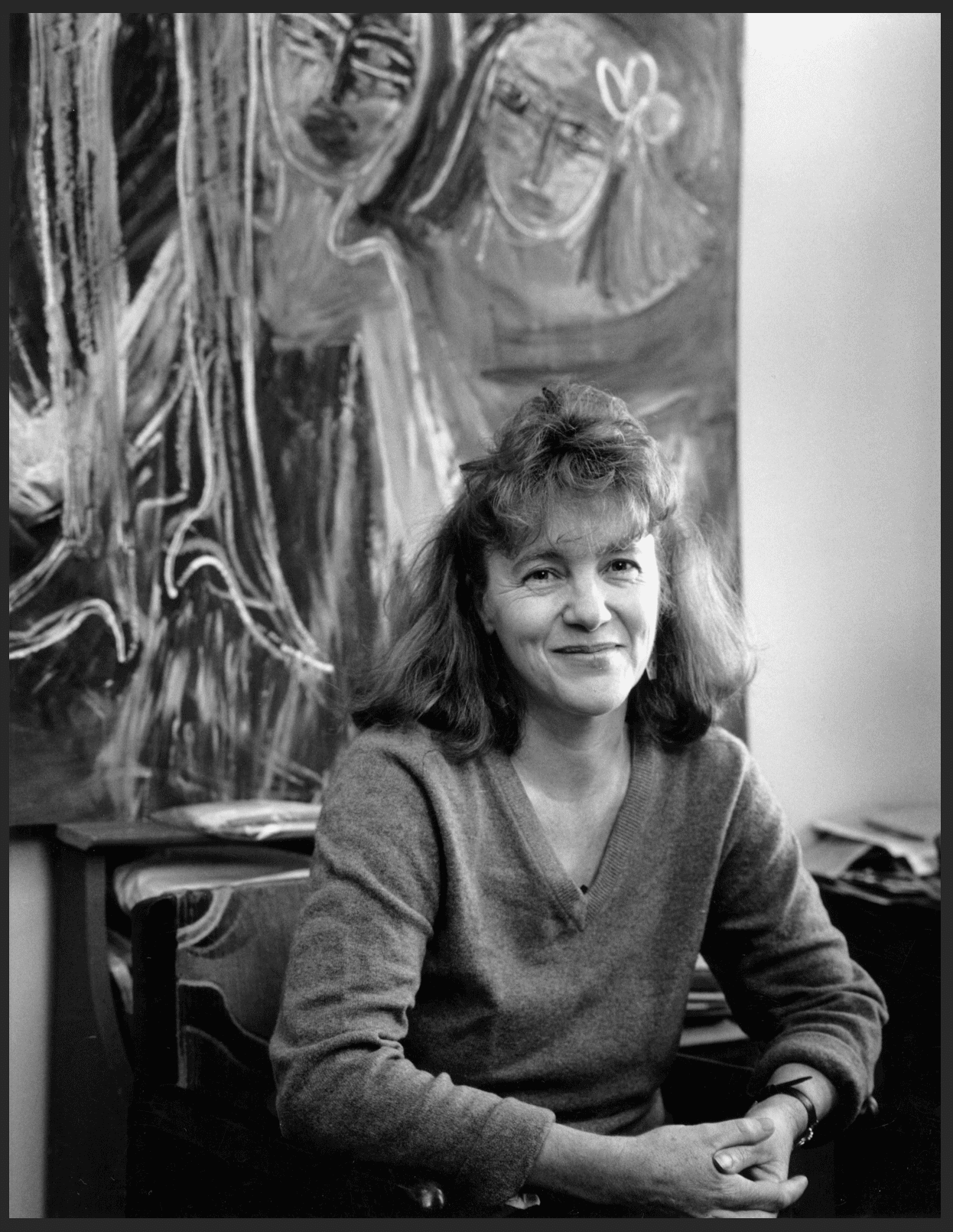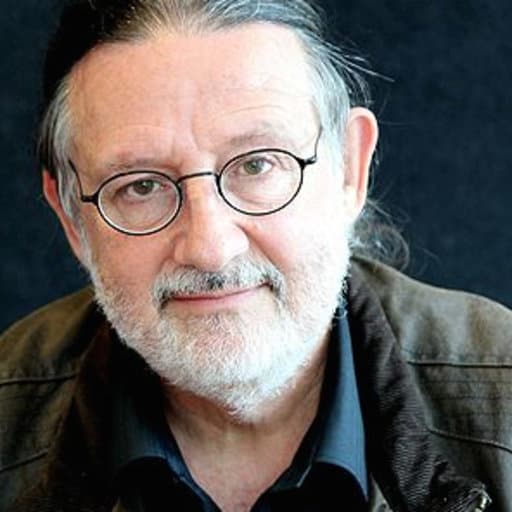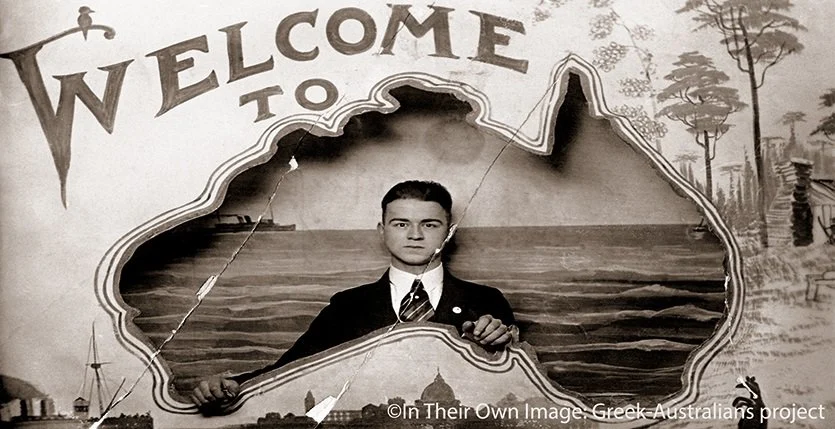Greek City Times is proud to present a weekly historical snapshot
from the archives of the ‘In Their Own Image: Greek Australians’ national project
by photographer Effy Alexakis and historian Leonard Janiszewski.

Vicki Varvaressos’ work has been critically acclaimed as “some of the most provocative paintings of women and women’s experiences in Australian painting…”. She has been professionally engaging her artistic passion since the 1970s, her early work being “influenced by the urban activism of Victoria Street in Sydney’s Woolloomooloo”. Though well-known for her ‘new wave feminism’ work that followed, her later interests embraced ‘painterly abstraction’ and ‘meditative portraits’. Watters Gallery in Sydney represented her for much of that time. Her works are held in numerous private and public collections, including the National Gallery of Australia, Canberra, the National Gallery of Victoria, Melbourne, and the Art Gallery of New South Wales, Sydney.
Vicki’s paternal grandfather, George Varvaressos, arrived in Australia in either 1913 or 1914 from Neapolis in the southern Peloponnese. His reason for leaving Greece was “the old story, to have a better life” and “the whole agrarian thing, people just having to go”. After initially undertaking several jobs, including work in the Greek-owned Athens Bakery in Sydney’s inner-city suburb of Redfern, George Varvaressos eventually acquired a butcher shop in Foveaux Street, Surry Hills, another inner-city suburb. The butcher shop became the family business. Later, under Vicki’s father and uncle, the business expanded and became known as the Sutton Forest Meat Company.
Vicki’s father, Theodore, came out in 1926 to join his father and the rest of the family, who had migrated in the early 1920s; Theodore had remained behind to finish his schooling. Vicki’s mother, Hariklia (née Karoni), was born in Tripolis in the central Peloponnese, and journeyed to Australia in 1938 to visit her siblings who had migrated earlier to settle. When war broke out, Hariklia couldn’t return to Greece. She subsequently met Vicki’s father and the couple married in Sydney in 1940. Vicki was born in 1949, their only daughter out of five children. After attending Ascham School (an independent non-denominational school), Vicki entered the National Arts School in Sydney in 1970.
Vicki:
“Career wise… being a girl, nobody ever said, ‘What are you going to do?’, it was just expected that when I grew up you were going to get married and that was that – end of life! … I found it extraordinary that I think I never heard the word ‘career’ at my school… So when I finished school … I’d heard about the Fine Arts course at university [Sydney University]. I thought that I had always enjoyed painting… but I had never met an artist – I didn’t know what such a person was really. Fortunately I suppose, in retrospect, I didn’t get in. So then I somehow convinced my father that it was okay to go to art school – the National Art School [located in Sydney’s inner-city suburb of Darlinghurst]. The course was four years… the Art School generally treated women as if they were there to kill time. That was the atmosphere… Art has become such a passion for me… Certainly it was there in art school and when I left. I knew I wasn’t going to get side-tracked into teaching. A lot of people got bought off. In those days it was “Take this scholarship [New South Wales Teacher’s Scholarship]”. I knew that if I got into teaching then I would never actually paint… I was committed… I painted despite the atmosphere of the time… Painting was seen as very bourgeois… All my work has been a reflection of what I’m interested in… The early work is very much issues, and there were other issues apart from feminism, but the feminism stuff was there… then the images became much more internal – ‘human existence’… My natural style… broad strokes and energy… belong much more to abstract expressionism [than to figurative painting]… From my early days I’ve always wanted to break up the thing. I can’t stand that you just have this image and that’s it… I’ve always been very interested in space. So even if it is a face, you have to travel through it. Recently, I have also done some non-figurative works. Someone suggested that maybe I’m just a repressed abstract expressionist!”
In regard to the generational, cultural identity of her parents and herself:
“I think they [my parents] see themselves as Greeks living in Australia... My mother’s English is not very good at all. She hasn’t had to use it except for now with all spouses and friends and what have you... But my father of course has got his early ‘twang’ from speaking English and being here younger, and having to use it because of business... I’m an Australian with Greek background. Because... my life, going to school, the things that I’m interested in, are not like other first generation [Greek-Australians] that go straight back into the life that their parents have had... except I do appreciate the things that I have got from it [my parents’ lives and cultural background]... But, you go to your parents’ house and you talk to your mother, you’re talking about some dispute, and the Church [Greek Orthodox], and someone’s recipe, and so you think, God, it’s another world. I’m not just a generation from my mother, I’m about five I feel! We’re close as far as family and stuff, but we’re just worlds apart.”
ABOUT EFFY ALEXAKIS & LEONARD JANISZEWSKI


Since the early 1980s, Effy Alexakis, a photographer, along with historian researcher Leonard Janiszewski, have been travelling around Australia photographing and collecting stories. They have also photographed Greek-Australians in Greece and documented some amazing histories. The images and text provide personal, diverse and powerfully moving insights, about opportunities, hopes and challenges. Collectively, these stories provide personal perspectives of a diasporic Hellenic identity. Their archive encompasses photography, both historical and contemporary, taped interviews and literary materials.
They have published 3 books and numerous articles, and their projects are ongoing. The photographs have been widely exhibited throughout Australia and in Greece.
VISIT THEIR LATEST PROJECT: Greek Cafés & Milk Bars of Australia | Facebook


